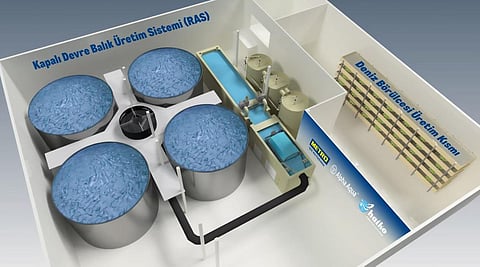

"We are pleased and proud to be chosen as the technology supplier for Metro Türkiye’s unique project," said Chief Commercial Officer of Alpha Aqua and Nordic founding partner, Yasin Kasa.
Photo: Alpha Aqua.
Turkish retailer Metro Türkiye has launched an innovative aquaponics system in the Turkish city of Muğla, combining aquaculture and plant cultivation, the company has announced.
The aquaponics system, the first of its kind in Turkey's retail sector, integrates the production of sea bass and salicornia, a succulent plant which grows in saltwater environments such as salt marshes, beaches, and mangroves.
Metro Türkiye partnered with Turkish fish farming company HATKO Aquaculture, Denmark-based RAS engineering specialist Alpha Aqua, and their Turkish partner Nordic, for the design and supply of a new, state-of-the-art facility utilising a recirculating aquaculture system (RAS).
The RAS used in the project provides enhanced control over water quality, temperature, and disease management, significantly reducing the typical growth period for sea bass from 14-15 months to 9 months, the company said in a press release.
“As Metro Türkiye, we see fish as a resource that should be left for future generations rather than worrying about it primarily being a commercial product. We have kept sustainable aquaculture at the centre of our purchasing policy since 2010 to protect marine fish stocks and species," said Deniz Alkaç of Metro Türkiye.
"Not only the fish in our seas but also the fish grown in farms need to be handled with a sustainable approach," he added, explaining that the plants will be grown in nutrient-rich water from the fish tanks, creating a "closed-loop".
"In the facility built in Muğla, we use feed consisting of algae oil and reduced sea fish content in the production of sea bass. With this special feed, we contribute to healthy nutrition by producing fish richer in Omega-3," Alkaç added.
The first harvest is expected within nine months, with products available early next year, Metro Türkiye confirmed.
"We are pleased and proud to be chosen as the technology supplier for Metro Türkiye’s unique project," said Chief Commercial Officer of Alpha Aqua and Nordic founding partner, Yasin Kasa.
“RAS technology, now in a more mature state after decades of development and implementation, offers high production efficiency through high fish welfare levels, precise water quality control, automated feeding based on fish appetite, and waste management," he said.
"It outperforms traditional aquaculture methods in resource utilisation and sustainability," Kasa continued, remarking on RAS's advantages in reducing water usage, minimising environmental impact through contained waste treatment, and enhancing biosecurity with its closed-system design.
"The RAS technology also provides advantages by bringing fish production closer to the end consumer for a lower carbon footprint in terms of transport and a much faster time to market, providing better and more fresh products," Kasa added.
